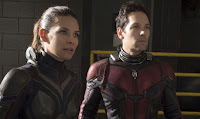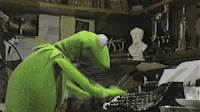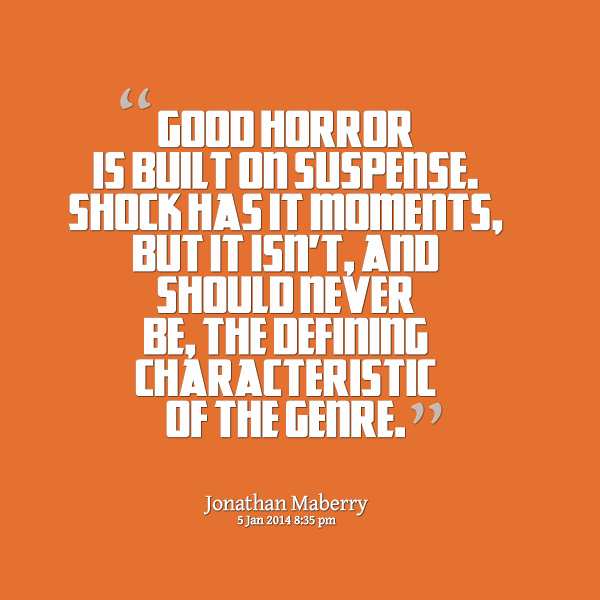Category: Maberry
March 13, 2019
This Little Piggy Went to Market
A couple folks have asked me questions related to marketing over the past few weeks, so I thought it’d be worth going over a couple things about this.
There’s a wonderful Richard Matheson quote that Jonathan Maberry related to me a few years back. If you’ve gone to either of the SoCal Writers Coffeehouses and listened to us speak (well, Jonathan speaks, I kinda babble on a lot until I run out of breath), you’ve probably heard it three or four times. Writing is art, publishing is the business of selling as many copies of that art as possible.
There’s a wonderful Richard Matheson quote that Jonathan Maberry related to me a few years back. If you’ve gone to either of the SoCal Writers Coffeehouses and listened to us speak (well, Jonathan speaks, I kinda babble on a lot until I run out of breath), you’ve probably heard it three or four times. Writing is art, publishing is the business of selling as many copies of that art as possible.
Marketing, big surprise, is part of publishing. It’s a very necessary part of publishing, whether I’m doing it myself, with a small press, or I’m the favorite author at a Big Five imprint. It’s how people discover I’ve got something to sell.
Marketing can take a lot of forms. It’s everything from me posting the new cover on Twitter to your book being plastered on the side of a bus. It’s the copy on the back of the book and me summing it up in two lines for you at a convention.
But the sole point of it, in all these examples, is to sell books.
And sometimes… this can create some conflicts with the art side.
As we move forward here, I’m sure some folks may try to read into this. It isn’t a subtweet or an angry rant. I’m not calling anyone out or absolving anyone of blame or any of that. I’m just tossing out some facts. Publishing is a business, and if I want to be successful in that business (and avoid a ton of stress), it helps to understand how it works.
Also, I know there’s a fine line between marketing and publicity and I always mess it up, so please forgive me if I weave back and forth across that line once or thrice here. I don’t think I’m ever going to end up in the other lane, but we may hear those bumpy lane divider once or thrice.
Okay, so, if marketing is getting people to buy my book, how do I do that? I can tell them the genre and see if it’s something they like. Maybe the type of characters I use. I can point out other books like it, or other storylines it may tie into. I can even offer little summaries or excerpts to tease potential readers with. Doesn’t this sound like a creepy/sexy/amazing/funny story? You saw the dragon, right? You know you like dragons. And this one’s got a lightsaber. Trust me, The Jedi of Krynn is the book you’ve been waiting your whole life for.
But seriously…
One of the big challenges here—the conflict between art and business—is how much do we tell? How do we find that fine line between getting the sale and keeping the book enjoyable? Tell too much and now all the book’s punch is already out there. Don’t tell enough and… well, maybe nobody reads it at all.
Do I mention every character in the book, even if some are supposed to be surprises? Should I mention the big twist? Should I hint at it? Heck, sometimes even just naming the genre can be a bit of a spoiler. And every spoiler saps a little bit of the story’s power… which lessens the chances for word-of-mouth sales. Now my cool novel is just kind of a bland book with no real surprises in it.
Sometimes what seem like simples questions can cause marketing headaches. For example…
Sometimes what seem like simples questions can cause marketing headaches. For example…
(Some minor MCU spoilers coming at you)
Does Ant Man & The Wasp tie into Avengers: Infinity War?
 Simple question, right? But how do you answer it? If I say no, there’s a bunch of people who might skip it. Plus, I’m lying, which people will then call me out for and complain about. If I say yes, people complain because… well, 99.5% of the film doesn’t tie in at all. And that last half a percent… well, if I’m saying yes, I’m kinda spoiling that super-powerful reveal, aren’t I? There really isn’t a good way to answer it.
Simple question, right? But how do you answer it? If I say no, there’s a bunch of people who might skip it. Plus, I’m lying, which people will then call me out for and complain about. If I say yes, people complain because… well, 99.5% of the film doesn’t tie in at all. And that last half a percent… well, if I’m saying yes, I’m kinda spoiling that super-powerful reveal, aren’t I? There really isn’t a good way to answer it.Of course, even not answering it at all can cause problems, because then people will speculate around that sort of “negative space” left by the non-answer. They’ll read into things, make assumptions, and develop expectations. And these expectations will either be correct, in which case… well, they’re acting like spoilers again. Or they’re incorrect, and now people are upset because the expectations they went in with aren’t being met, no matter what the actual story is (or how good it is).
There’s another angle here, too. One you’ve probably heard before. People like series. They like them a lot, if you look at sales records. To be honest, publishers like them, too. Editors love to see a new book with series potential. And spin off potential. And tie-in potential.
But here’s another catch. People want to know how all this stuff fits together. They want to know if something is canon or set on Earth-23 or Earth 15 but stillcanon or does this involve Wakko before or after his cybernetic upgrades? Because let’s face it—there’s no point reading any of the stories before he became bionic, right? Why even bother?
 So when things don’t fall into a neat A-B-C,
So when things don’t fall into a neat A-B-C, Sure, we could leave them unnumbered but… well, that could cost sales, too. Some folks don’t like reading a series until it’s done, and if I don’t say it’s a trilogy or whatever, well… maybe they’ll never pick it up at all. So I probably need some kind of designation if I want these to sell, right?
Or do I?
Plus… sometimes explaining where things fit in can be a spoiler. We thought this story was in the future, but it’s actually in the past. We thought it was here on Earth but it’s actually on the mirror-universe world of Urth. And that puts us back at… well, what do we tell? How do we keep the book enjoyable while also getting people to buy it?
It’s a mess. Seriously. And everyone’s clawing their way through trying to find a balance that preserves the art but still serves the business. Everyone knows you can’t pick one over the other, but every single book (or movie or television show) becomes a new attempt at finding that balance point. The guidelines we use for my book won’t work for yours.
And it doesn’t help when some folks, deliberately or not, muddle things even more. We’ll play up the mention of that character or the appearance of that plot thread. I’ve seen things described as romances because of one thin subplot, or spiritual because someone prays at some point (I won’t tell you what they were praying for…) I’ve mentioned before how for a while any book or movie with a somehow-superhuman character was billed as a superhero story. These are the things that make people grumble about marketing, and make marketing folks grumble about people who just follow buzzwords.
Anyway…
I just thought it was worth tossing this out. Mostly because a few folks have complained long and hard about the marketing for Dead Moon. I’ve tried to address some of these things for, oh, eight or nine months nowbut… well, as I’ve been saying, some complaints are inevitable, no matter what.
But also partly because, like I said in the beginning, this is stuff worth knowing and thinking about.
And I’m sure there will be some more thoughts down in the comments.
Next time—like, tomorrow—some thoughts on dialogue.
Until then, go write.
July 16, 2018 / 1 Comment
SDCC Schedule
 Hey, folks. As you may have heard, there is this celebration of the popular arts down in
Hey, folks. As you may have heard, there is this celebration of the popular arts down in As it happens, though, this year all my events for San Diego Comic Con have fallen on the same day. So I’m pretty much going to be there for Thursday and… well, that’s it. I may wander around a bit Friday, possibly duck in Wednesday night to get one of the cool Beebo bags.
But really, your best chance to find me is going to be on Thursday.
Signing – Crown Publishing Booth (#1515-J)
This is just a little unscheduled thing as I scribble in copies of Paradox Bound for the Crown folks. Please feel free to stop by, say ‘hullo,’ and pick up a book for me to personalize for you. It is informal, so I’ll probably only be here for 20 or 30 minutes.
This is just a little unscheduled thing as I scribble in copies of Paradox Bound for the Crown folks. Please feel free to stop by, say ‘hullo,’ and pick up a book for me to personalize for you. It is informal, so I’ll probably only be here for 20 or 30 minutes.
Writers Coffeehouse (Santa Rosa Room at the Marriot)
Come hang out with me and Jonathan Maberry (author of Glimpse, Mars One, and many others) as we talk about a lot of publishing-related topics, answer questions, and generally just chat in a very casual way. It’s a two-hour version of the three hour Coffeehouse we each host in LA and San Diego
Signing –Mysterious Galaxy Booth (#1119)
After the Coffeehouse I’ll be here signing… well, everything at the Mysterious Galaxy booth until 6:00 . I mean everything. I think they’re going to have a ton of my books, but I’ll be signing in other books, too. Lots of other books. Everyone else’s books. You can finally get that signed copy of Ready Player One you always wanted…
That’s pretty much going to be me at SDCC this year. Hopefully I’ll see you there, and maybe we’ll get to talk for a bit.
Until then… go write.
August 27, 2015 / 2 Comments
Q-n-A Bonanza Extravaganza
Spectacular spectacular!
What I’m going to do this week is run through a few questions and requests that have shown up here this summer. A few of them I can do a full post on, but some of them are things I’ve touched on before (or, at least, I think I have) so I think I can answer them with a few paragraphs and links.
So… let’s get to it.
How similar are your drafts in terms of character arcs and overall plot?
Tricky question that’s going to be a little different for every writer and for every project. For me, once I get a pretty solid draft, it’s really rare for things to change that much. It happens sometimes, but not often. I think once the plot and story are solid, for most writers, there won’t be any real changes to them.
Please note, though, that I didn’t say no changes. Every draft is going to be a little different as I tweak and cut and make other adjustments. But all of these adjustments serve the plot and the characters. Things are just getting tighter and clearer. Maybe it means omitting a few story beats or changing someone’s second language from French to Spanish. But these changes aren’t changing the bigger picture, they’re enhancing it.
 It’s probably worth mentioning that if I’m making changes that do radically alter my plot or characters, what it really means is that I don’t have a solid draft yet. Yeah, even if I’ve done six drafts before this. If I suddenly realize Yakko should be my main character while Dot’s the supporting character who dies in the second act… that’s a big change. That’s a lot of changes. It means different interactions between different characters, new motivations, possibly a whole new linear structure. And it also means I’m kind of going back to square one. Now I need to tweak and cut and make adjustments to this plot and story.
It’s probably worth mentioning that if I’m making changes that do radically alter my plot or characters, what it really means is that I don’t have a solid draft yet. Yeah, even if I’ve done six drafts before this. If I suddenly realize Yakko should be my main character while Dot’s the supporting character who dies in the second act… that’s a big change. That’s a lot of changes. It means different interactions between different characters, new motivations, possibly a whole new linear structure. And it also means I’m kind of going back to square one. Now I need to tweak and cut and make adjustments to this plot and story. Do you have any thoughts on working on multiple projects at once? Like editing one, drafting another, plotting a third? Is that something you do?
Yeah, I do this, but in a bit more limited sense. When I’m working on a first draft of something, I focus pretty much exclusively on that. Once I’m out of that, though, and into the editing, I’m always jotting down character ideas, lines, beats—all sorts of elements—for whatever I’m going to be working on next. So while I’m doing drafts on one I’m setting all the groundwork for another. I’ve also found this helps me as far as any kind of block goes—being able to dip my toes into something else helps keep my brain from getting stuck on a project.
Overall, though, this is one of those things that’s definitely more advice than rules, because it’s all going to come down to the individual. Am I someone who can split their attention or not? And to what extent? Some folks can do it (to different degrees), some folks can’t. Unfortunately, the only way to find out is to try it once or thrice. I’m comfortable at the level I just described. You might be able to do two or three things side by side. Someone else might need to focus on one thing at a time.
I do think it’s worth noting that “another project” can easily be a distraction, too. Sort of like eating when you’re bored. I’ve also seen some folks use multiple projects (consciously or not) as an excuse to never finish anything. Sooooo… something to keep in mind.
I’m still struggling with how writers develop an interesting narrative voice – character voice I think I’m getting the hang of, but the narrative bits still sound like me reading a grocery list.
Narrative voice can be tough. Part of it depends on how much I want to insert myself as the author. Some folks do this extremely well, others… not so much.
As far developing a narrative voice goes, think of it like a narrator. Who’s actually telling this story to the reader? I’m not saying my book or short story has to be in first person, or that a narrator even has to exist, but in my perfect world, who’s reading this aloud? Christopher Lee? Felicia Day? Doug, the guy down at the garage? Ms. Phoebe, my college English professor? Knowing the narrator tells me how they talk and what kind of words my narrative voice will use.
So, from a certain point of view, the narrative voice is another character. Even if it’s me, it’s the version of me I’m choosing to project through my writing (a friendly me who wants you to enjoy the story and is going to tell it in fun, simple terms, and who also has much better abs…). So narrative voice is a lot like character voice, which is something I mentioned here just a few months back. Well, okay, a year and a half ago…
It’s probably worth mentioning that if there isn’t some kind of narrative voice in my head to start with, that might be a sign of a bigger problem. If I have no sense of how my story should be told—how my audience should be hearing the words in their heads—I may need to stop and think about things some more. Maybe the plot or the story aren’t as solid as I thought, and if they’re not clicking with me, there’s a good chance they won’t click with anyone else.
Do you feel an author should stick to one genre for the most part? I want to go write something as far from my current genre as possible. Will that throw my fans for a loop? I notice that you and most other authors pretty much stick to one thing.
 Well, I’d argue not much of my work falls in the same genre, unless we’re talking in broad, sweeping terms. I’ve got a superheroes vs. zombies series (sci-fi fantasy with some soft horror), a suspense-mystery-horror novel, a sci-fi thriller, a classic mash-up where I share credit with Daniel Defoe, and I just started work on a historical time-travel road trip story. I’ve also got some short stories out there that are straight horror, some that are straight sci-fi, and even a pulp action war story.
Well, I’d argue not much of my work falls in the same genre, unless we’re talking in broad, sweeping terms. I’ve got a superheroes vs. zombies series (sci-fi fantasy with some soft horror), a suspense-mystery-horror novel, a sci-fi thriller, a classic mash-up where I share credit with Daniel Defoe, and I just started work on a historical time-travel road trip story. I’ve also got some short stories out there that are straight horror, some that are straight sci-fi, and even a pulp action war story. And I’m not alone. The majority of writers work in a bunch of genres. They may be known for one thing, but they’ve usually got a lot of other stuff past that. Jonathan Maberry, Seanan McGuire, Scott Sigler, Craig DiLouie, Eloise Knapp, Timothy Long—and these are just the ones I know personally. All of them have written in at least two or three genres.
Heck, look at Stephen King. He’s known as a horror writer, but Firestarter and The Dead Zone, two of his earliest works, are pretty much straight sci-fi when you really look at them (there’s a post in that alone). Under the Domeand 11/22/63 are both pretty solidly sci-fi, too. The Dark Tower series is an epic fantasy. Eyes of the Dragon is a young adult novel. And then there’s “Rita Hayworth and Shawshank Redemption,” a prison drama/character study that was adapted into a wildly popular film by Frank Darabont.
So, no. I don’t think an author needs to stick to one genre. Yeah, there are some fans who might get upset I’ve moved away from their particular interest, but there’ll be just as many who’ll be intrigued to see how I deal with something else, and new ones who’ll come to me because of that something else. And it’s my opinion that flexing those other muscles, so to speak, usually makes someone a better writer overall.
I will say, though (there’s a “however…” on almost all of these, isn’t there?), that I don’t recommend chasing the popular trend. It’s tempting to jump on the nymphomaniac-android-biker-school-romance bandwagon, I know. But it rarely works out well in the long run.
And I think that’s everything for now, yes? Okay, I went over three or four paragraphs for some of them, but if you’re going to complain about that… Also, if I misread your question somehow, or if my answer just wasn’t complete enough, please say so down in the comments and I’ll try to answer there. Or maybe bump it up to a full post.
Next time, I’m going to answer one of those larger questions I mentioned up at the top.
Until then… go write.




